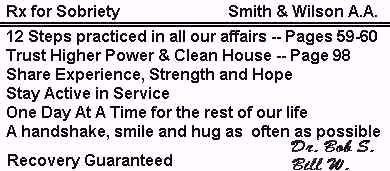


Click The Images To Go To Page Indicated In The Flag
4th Step Tips
by Mike L.
"Carry THIS Message" Group
West Orange, NJ
The following is a list of tips and tools that may be helpful when doing your 4th or assisting your protégés with Step 4:
- Keep It Simple!
- During early sobriety, I heard much negativity spoken about the 4th Step that scared me. No wonder why people are scared to do this vital step. Shouldn't we try to encourage new people to do this step, which will put them on the path to freedom, rather than discourage them from doing it by making negative comments and instilling fear in them? Just a thought.
- Emphasize the importance of writing the 4th Step inventory. There are a total of 17 references in the Big Book that suggest our 4th Step should be written. The word "written" is used 2 times (pages 70 & 75). The word "paper" is mentioned 3 times (pages 64, 68, & 69). Some form of the word "list" is given 10 times (pages 13, 64, 65, 66, 67 twice, 70 twice, & 76 twice). Page 67 says we placed our faults before us in black and white. And finally, page 65 gives an example of a written inventory.
Gee, I guess it's pretty important that we instruct our protégés to WRITE their inventory, huh?
- Step 4 is the beginning of the treatment for our "spiritual malady", which is the root of our problem in Step 1. Other branches (symptoms) of Step 1 that stem from the root (spiritual malady) are the physical craving (which deals with the body) and the mental obsession (which deals with the mind). Page 64 says, "When the spiritual malady is overcome, we straighten out mentally and physically." Upon completion of Step 4, we are well on our way to carrying out the solution (described to us in Steps 2 & 3) to our problem (in Step 1).
- The Big Book instructs us to inventory three "common manifestations" of self-will: resentments, fears, and harms done to others (with emphasis on our sexual misconduct). (Remember, page 68 says we need an "overhauling" in the area of sex - not a minor tune-up! Honesty and thoroughness are key - the $19.95 Jiffy Lube Special won't fill the bill.)
- Resentment inventory is most easily done in columns, as illustrated on page 65 of the Big Book. Experience proves that a 4-column-inventory format is the best. Even though page 65 gives an example of three columns, the instructions for writing the 4th column of "faults and mistakes" where we see the truth of our behavior are found on page 67. The column format allows the protégés to see patterns more easily. Most people benefit from writing their columns vertically. We write inventory vertically, but read inventory (during Step 5) horizontally. (NOTE: I used to instruct my protégés to use the 4-column format for all the inventories. Having done many 4th Steps over the years, my experience has been that the column format is best suited for resentment and fear inventory.
I now prefer writing sex/harms inventory by just answering the 9 questions found on page 69 in paragraphs. It has been easier and less restricting for me to do this part of the inventory in a horizontal "mini-essay" type format.) But beware: don't get caught up in technique and formats. When it comes to writing inventory, as Nike™ says, "JUST DO IT!"
- "Should I put my name in column 1?" is a question often asked by protégés when doing Step 4. There is much debated on this subject over what is the "right" or "wrong" answer. I don't debate this issue. Some people need to list themselves as part of their inventory, others don't. How do I know if a person needs to put his/her name on their resentment list? If I tell them "No, you can't!" or "You MUST put your name at the top of the list!" aren't I "playing God"? In the 3rd Step I made a decision to quit playing God. So, I don't tell protégés who they should or shouldn't list on their inventory.
If I'm asked the question of "Should I list my name?" I ask the person, "Do you resent yourself?" If they say "yes" I then ask them "Why do you resent yourself?" Providing they can answer that question, I then tell them, "Well, I guess you should put yourself on the list because your first two columns are already complete. You're halfway finished. Why stop now!"
- There are actually four inventories we should be writing as part of the 4th Step: "Resentments", "Fears", "Sex", and "Harms to Others". There are some people on my inventory that I harmed but I didn't resent them, fear them, nor have a sexual relationship with them. So if I hadn't done a "Harms to Others" inventory as page 70 suggests ("We have listed the people we have hurt by our conduct, and are willing to straighten out the past if we can.") then I would have missed important truths that needed to be on my inventory and shared in Step 5. And besides, when we get to Step 8 page 76 says, "We have a list of all persons we have harmed and to whom we are willing to make amends. We made it when we took inventory."
- According to the Big Book, we do not write our "life story" in Step 4. It suggests we tell someone all our life story in Step 5 - NOT WRITE IT. As we're reading our 4th Step inventories to someone in Step 5, what we're actually doing is telling them our "life story". Looking back, my "life story" was as simple as this: Because of my selfishness and self-centeredness (the spiritual malady) I caused harms to other people. This caused me great fear. Because the fear became too intense for me to handle, ego caused me to "turn the tables" and become resentful toward those I had harmed, which made it look like others harmed me and I was innocent. This allowed me to block-out the harms I did to others and all I remembered were the resentments I had toward them. Most of my harms were caused within relationships. There's no wonder in my mind why this is true. What other "tools for living" do fearful and resentful people have? (No, suicide and homicide don't count! They're not "tools for living". They are "weapons of destruction"!) We do what we know best. So, I harmed others because of resentments, fears, and other defects stemming from selfishness and self-centeredness (spiritual malady). There! End of life story! Can I go home now?
- Avoid inventorying your "assets" in Step 4. Our assets never got us into trouble. Our defects block us from God's Power, not our assets. Many people over the years have confused the first sentence from the following quote on page 46 of the 12 & 12: "The sponsor probably points out that the newcomer has some assets which can be noted along with his liabilities. This tends to clear away morbidity and encourage balance. As soon as he begins to be more objective, the newcomer can fearlessly, rather than fearfully, look at his own defects." Somehow, we alkies, who are experts at interpretation, have turned that statement around to justify an "assets and liabilities checklist" for the 4th Step inventory. That may be a handy tool for Steps 6 & 7, but many alcoholics are dying because they never come face-to-face with the truth in Step 4. My sponsor has always insisted that I remember it was never my "assets" which got me drunk.
- Don't forget: Praying is a part (a big part!) of Step 4. The prayers in the 4th Step are just as important as the actual writing of the inventory. Chuck C. used to say that the Steps are about UNCOVERING, DISCOVERING, and DISCARDING. The writing of Step 4 helps us to uncover. The prayers help us to discover. Steps 5 through 9 enable us to discard.
- We write inventory to discover the TRUTH... about the LIE.
(NOTE: You may need to meditate on that statement for a while before you really understand it. I had to. Of course, getting lots of experience by writing inventory helped me understand as well. Experience is the name of the game when it comes to working with others.)
Step 4 helps us to discover truth by working from the outside, moving inward. In resentment inventory we discover that our troubles are not of someone else's making (columns 1, 2, 3); but instead, as mentioned on page 62, our troubles are of our own making (column 4). Quite often a protégés will discover that the first 3 columns of his/her inventory are based on a "lie" by the time they begin working on their 4th column. In inventory, I write about "who I am not" to discover "who I am".
- A thorough 4-column-inventory will give your protégés all the information they need for completing the rest of the "housing-cleaning" steps: He/she will use all four columns for Step 5. They'll use columns 3 & 4 for Steps 6 & 7. And column 1 will be used for Steps 8 & 9. So, if this is true, then you may not want to burn your inventory, as we are sometimes told to do by members of our fellowship. If you must discard your inventory (which is necessary for some people), then wait until you've completed Steps 5, 6, 7, and have made a separate and thorough list for Step 8.
(NOTE: I am occasionally faced with the old "dog ate my homework" excuse from protégés who don't want to complete their 9th Step amends. So, be careful with the "burn your inventory" suggestion. Believe it or not, it's NOT in the Big Book.)
- Even though this is not mentioned specifically in the Big Book, by completing a searching, fearless, honest, and thorough inventory we are examining the 4 dimensions of our life: physical, mental, emotional, and spiritual. (BUT only the fourth dimension, "spiritual", is rooted in Truth. But set that aside for a moment and read on...) Column 1 of resentment inventory deals with the physical - Who or what we're mad at. Column 2 deals with the mental - What we think they did to us. Column 3 deals with the emotional - What we felt when they supposedly wronged us. (Clarence S. used to say that alkies don't think, "THEY EMOTE!" which means we feel our way through life.)
And finally, Column 4 rockets us into the spiritual dimension, revealing the "exact nature of our wrongs" - the truth about what really happened. It usually reveals to me how my faulty thinking caused me to take actions which got the "ball rolling" in the first place. With 99% percent of the resentments I see (both in myself and in those I work with) the first 3 columns can be turned into a lie when the truth of the fourth column is revealed.
Consider this: Is it possible that the 4th column of inventory, which reveals to us the "truth", is the "fuel" that enables us to be rocketed into the "Fourth Dimension of Existence" that the Big Book describes on pages 8 & 25? This "Fourth Dimension" is later described on page 84 as the "World of the Spirit" as we begin to commence daily spiritual living with Steps 10 & 11. The "World of the Spirit" is a constant because Truth, which we first discover in the fourth column of Step 4, is a constant. Truth is always present at the core of our Being even when covered up (or blocked) by a lie.
- Show your prospect that inventory can be fun! Don't treat inventory as if you're going to a funeral. Treat it like your witnessing the birth of a new child... because you are! Of course Step 4 is a serious life and death matter; but it will be encouraging if you can show your protégés to have fun with inventory. And above all, "Keep It Simple!"
Remember: "IF IT AIN'T IN THE BIG BOOK, IT AIN'T!"
With Love & Service,
Mike L.,
"Carry THIS Message" Group
West Orange, NJ
973-731-1073
Email: mjl221@att.net
Mike wrote me back after I put this up on the web ... he writes:
"Ever since I wrote that I get a kick out of how numbers 1 and 15 say "Keep It Simple" and then I go on to write 13 other points that complicate the hell out of it! LOL! Gotta' love us drunks! Especially us "Triple A's.""
Index of AA History Pages on Barefoot's Domain
As in so many things, especially with we alcoholics, our History is our Greatest Asset!.. We each arrived at the doors of AA with an intensive and lengthy "History of Things That Do Not Work" .. Today, In AA and In Recovery, Our History has added an intensive and lengthy "History of Things That DO Work!!" and We will not regret the past nor wish to shut the door on it!!
ABC Page 60 from the Big Book
KEEP COMING BACK!
ONE DAY AT A TIME!
 Barefoot's World
Barefoot's World

On the Web September 5, 2002 in the Spirit of Cooperation
Three mighty important things, Pardn'r, LOVE And PEACE and SOBRIETY

|




